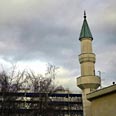
Rights watchdog hints Swiss minaret ban illegal
European Court of Human Rights says vote on banning Muslim icon may violate fundamental rights. Professor: Other European countries will have to face issue
A Swiss ban on minarets could violate fundamental liberties, Europe's top human-rights watchdog said Monday in an indication that the heavily criticized vote could be overturned.
The Swiss justice minister also said the European Court of Human Rights could strike down the Sunday vote, which incurred swift condemnation at home and abroad for banning the towers used to put out the Islamic call to prayer.
The 47-nation Council of Europe said that banning "new minarets in Switzerland raises concerns as to whether fundamental rights of individuals, protected by international treaties, should be subject to popular votes." Switzerland presides over the council, which is associated with the European Court of Human Rights. The court rules on breaches of the European Convention on Human Rights.
Justice Minister Eveline Widmer-Schlumpf said the ban would come into force immediately, but indicated that it could be overturned.
"The ban contradicts the European Convention on Human Rights," Zurich daily Blick cited Widmer-Schlumpf as saying.
The referendum backed by nationalist parties was approved by 57.5 percent of the population Sunday, forcing the government to declare illegal the building of any new minarets in Switzerland. It doesn't affect the country's four existing minarets.
France's Foreign Minister Bernard Kouchner said he was "a bit scandalized" by the vote, which amounts to "oppressing a religion."
"I hope that the Swiss will go back on this decision rather quickly," Kouchner said on France's RTL radio. "It is an expression of intolerance, and I detest intolerance."
The UN's special investigator on religious freedom, Asma Jahangir, said the ban on new minarets constitutes "a clear discrimination against members of the Muslim community in Switzerland."
Ekmeleddin Ihsanoglu, the secretary general of the Organization of the Islamic Conference, called the ban an "example of growing anti-Islamic incitement in Europe by the extremist, anti-immigrant, xenophobic, racist, scare-mongering ultra-right politicians who reign over common sense, wisdom and universal values."
Wealthy Arab tourists might think twice now about spending their money in Geneva and other Swiss cities popular with visitors from the Gulf, and the neutral country's efforts to mediate in the Israeli-Palestinian conflict could also suffer, said Daniel Warner, a Swiss-American political scientist at the Graduate Institute in Geneva.
Arriving at a meeting of European Union justice ministers, Widmer-Schlumpf argued the vote was not "a referendum against Islam ... but a vote directed against fundamentalist developments."
She defended the referendum as being "about minarets and not, of course, about the Islamic community," she said. "We are interested in a multi-religious society in Switzerland."
'They have to adapt to us'
Supporters of the ban said the number of Muslims in Switzerland had grown sharply from 50,000 in 1980, but it is still only 4 percent of the 7.5 million population, many of whom don't practice. Western Europe has an estimated 14 million Muslims.
Voting figures showed a rural-urban split in the Swiss vote, with only 38.6 percent of people in major cities backing the ban compared with about two-thirds of the population in smaller towns and villages, officials said.
Anne-Marie Birnstiel, in the wealthy Alpine town of Gstaad told AP Television News she was disappointed by the vote and afraid of the consequences for Switzerland.
But, fellow town resident Anton Seil told APTN that "we are in Switzerland, and if I go to another country I also can't build up my church or represent my faith. So, they have to adapt to us in Switzerland too."
Switzerland isn't alone in expressing fears about a growing Muslim population, though it is the only country where voters can easily enact constitutional amendments through referendums.
France, too, has enacted laws that Muslims claim are directed at them, including a ban on the wearing of religious symbols, such as headscarves, in schools.
Overnight, opponents of the minaret ban lit candles in front of the Swiss parliament in Bern and hung up banners saying "This is not my Switzerland."
In Zurich, unknown people smashed a glass door of the offices of the nationalist Swiss People's Party — which had backed the ban — cantonal (state) police said.
Moshe Maor, a professor of political science at the Hebrew University in Jerusalem, said the referendum was seen by the far-right parties Switzerland as an opportunity to promote their political agenda.
"The rightist parties in Europe do not have a solid ideological foundation," he told Ynet, "They only have the political capabilities to take advantage of certain issues to increase support for them. The minaret issue fell into their hands like ripe fruit."
Professor Maor said he expects the issue to gain support throughout Europe. "If the neutral Swiss decided (to ban minarets), then it gives the debate legitimacy.
"Ruling parties (in Europe) will be torn between the multi-cultural democratic approach and the realization that the majority of people do not want these Islamic characteristics," he added. "The question is how will they find the balance."










